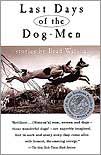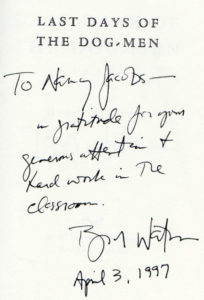Major Works
- Miss Jane (2016)
- Aliens in the Prime of Their Lives (2010)
- The Heaven of Mercury (2002)
- Last Days of the Dog-Men: Stories (1996)
Brad Watson: A Biography
by Travis Campbell (SHS)
Brad Watson, born to Robert Earl Watson and Bonnie Clay Watson in Meridian, Mississippi, on July 24, 1955, published his first work, a collection of short stories called Last Days of the Dog-Men in 1996, and won a Sue Kaufman Prize for First Fiction from the American Academy of Arts and Letters.
However, Watson did not start out to become a writer. He was a high-school student/actor who married the summer of his junior year in high school. At seventeen, after graduating from high school, Brad Watson left Mississippi with the hope of making a name for himself in Hollywood. His stay in Hollywood, however, was not long because there was a strike. After finding work only as a garbage man (which was a job he loved because of the solitude it provided him), Watson came home to Meridian where he got a job as a carpenter.
Finally, after some persuasion from his family, Watson enrolled at Meridian Junior College, a turning point in Watson’s life. Because he scored high on the entrance English exam, he was placed in an Honors English class. Although Watson had no previous interest in writing, this class turned him on.
Watson decided to further his education at Mississippi State University in 1976 by majoring in English.
During Watson’s first summer at Mississippi State, he wrote his first short story. In 1978, after graduating from Mississippi State with a bachelor’s degree in English, Watson enrolled at the University of Alabama where he pursued a Master of Fine Arts in creative writing and American Literature. He then moved to the Alabama gulf coast to work as a newspaper reporter for a couple of years. He also worked as an editor at the Montgomery Advertiser and spent a year in an ad agency before returning to Tuscaloosa to teach in 1988. He moved there with his wife and three-year-old son and taught creative writing at the University of Alabama.
Before he completed Last Days of the Dog-Men: Stories by Brad Watson in 1996, Watson had also worked in the University of Alabama public relations office for four years. Watson says the inspiration for writing stories about dogs and people came from his childhood. He said everyone he knew had a dog, and he related the dog’s personality with the owners.
Returning to full time teaching, Watson moved to Harvard in 1997 to teach. He taught there until his second book, a novel called Heaven of Mercury, was published in 2002. Originally, the book was to be called Obituary of Helen Browning Wells. Following the publication of his novel, he took visiting writer-in-residence positions at the University of West Florida, the University of Alabama, Ole Miss (as Grisham Writer-in-Residence), and the University of California, Irvine. In 2005 Brad Watson began teaching at the University of Wyoming in the MFA program where he continued to teach until his death in 2020.
A novella and stories titled Aliens in the Prime of Their Lives was published by W.W. Norton (also the publishers of his first two books) in March 2010. These stories were first published in The Oxford American, The Yalobusha Review, Greensboro Review, Idaho Review, The New Yorker, and elsewhere.
In July of 2016 W.W. Norton published Miss Jane by Brad Watson to rave reviews. Watson served on the Mississippi Book Festival panel which discussed Southern Fiction Today on August 20, 2016.
According to his website, Watson has two sons and a granddaughter. He was married to writer and horse trainer Nell Hanley, who, “in addition to a whole lot of other things, cares for their (her) five horses on their property on the windy plains just south of Laramie. ” Brad Watson, an award-winning author and the director of University of Wyoming’s creative writing program, died in July 2020 at the age of 64.
Reviews
A Review of Watson’s Miss Jane by Boyce Upholt (Used by permission) July, 2016
My girlfriend glanced at the cover of Miss Jane, (W. W. Norton) resting on my nightstand, and expressed a bit of surprise. That reaction was probably well founded. Sometimes I limit myself — to my own detriment — to the more overtly masculine edges of the literary world. But here was a novel named for its female protagonist, its cover emblazoned with a blue peacock that might be woven from silk. “Pretty,” she called it. Had that jacket bore some other writers’ name, I might never have picked the book up.
But Brad Watson is the author of two of my favorite contemporary short story collections, both of which explore (among other topics) lonely men in rural Mississippi whose lives are more than halfway wild. From that description you might expect a Southern update on Hemingway, terse and clipped. Watson is nothing of the sort. His great virtue — and why I consider him an under-known contemporary master — is his ability to weave a delicate and ornate sentence, the kind that ought to turn top-heavy with descriptors and syntactical untanglings, yet never weighs itself down or falls apart. These sentences begin in some ordinary moment, before dipping and weaving through past and future, even into other transcendent, hoped for world.
“Miss Jane” is no different. In the 14 years since the publication of Watson’s first novel, “The Heaven of Mercury” (which was a finalist for the National Book Award) his sentences seem to have settled slightly — less showy now, and more elegant for that restraint.
Still, this novel functions just like all of Watson’s best work, building through its intricate sentences a reminder of the strangeness of our very real world, until eventually the reader is hypnotized into an indirect contemplation of what it means to be.
This book, like everything Watson has written, might aptly be called lyrical. And according to bad gender stereotypes, such lyrical writing is feminine. Then again — fitting for a year in which we are discussing whose bodies are allowed in what bathrooms here in Mississippi — this novel raises questions about whether or typical definitions of gender make much sense at all.
The eponymous Miss Jane is born with a rare urological condition that keeps her privates trapped inside her skin. When Jane’s father, a smalltime bootlegger, first sees his daughter, he says he knows she is a girl only “because, I reckon, it’s clear she ain’t a boy.”
In the early 20th century, when Jane is born, her condition is so rare as to have no medical name. Instead, it is simply called an “affliction.” What is clear, though, is that Jane’s life will be difficult. Prone to soil herself, she fasts until she is light-headed just so she can go out and socialize. Worse, Jane cannot procreate, and so according to the norms of the time and place (a fictionalized version of Meridian), she is not a suitable candidate for romantic love. Nevertheless, Jane does finds love, in many forms — sometimes cruel, sometimes failing, but always there, pulsing at the edges of her life. The book itself is an act of love, I think, an imaginative leap by Watson to understand the unusual life of his own, similarly afflicted great-aunt.
From the first page, Watson resists the mechanical notion of plot. We begin not in scene, but with a hovering summary that evokes Jane’s life through negation: we find ourselves amidst a list of all the things that Jane refuses to fear. From there, the story tumbles through facts and memories — later, for example, a list of all the foods that Jane loves — that conjure in their accumulation a fully vivid life.
At one point late in the novel, the doctor who delivered Jane — and who has since become her closest friend — writes a letter to a colleague. He marvels at how strange it must be to be Jane: to be “trapped inside my own skin and all but inaccessible to anyone or even anything beyond my own blood, other bodily fluids, the microscopic eyes we might imagine to exist in the very cells that make up what and who we are.” Which goes to show that Watson’s accomplishment here is a marvel. We all share the affliction that the doctor describes; none of us can ever cross the physical distance into the cells of another person.
“Miss Jane” demonstrates that through the act of imagination we can enter into another person’s soul. Such imagination, though, requires ignoring boundaries and limits — including the conventions of gendered genres and gender norms — so that we can fully offer ourselves to the world of love.
Boyce Upholt is a writer based in the Mississippi Delta.
A Review of The Last Days of the Dog-Men
by Travis Campbell (SHS), 1997
The Last Days of the Dog-Men by Brad Watson is a collection of short stories about dogs and their relationships with mankind. Watson writes of dogs as companions who have the innocence of children yet the intelligence of wise, old men. Watson’s stories of honorable dogs seem realistic. Two short stories that I especially enjoyed are “Seeing Eye” and “A Blessing.” “Seeing Eye” is a short story about a seeing-eye dog named Buck. One morning Buck walks up to a street corner and stops. On the other side of the street, a traffic signal flashes the words “Don’t Walk.” Buck sees this sign but pays little attention because Buck is trained to watch for moving traffic and to take care of his master. Throughout the story Buck notices different things about his surroundings but is never distracted, thus doing his job. Several symbols can be found in the story. Many distractions such as the rushing traffic, the squeaking of the cars, the flashing lights, people talking, and smells from a nearby factory are all symbols of society’s ability to distract someone. Buck is very much a symbol also. Buck may clearly be interpreted as an orderly figure, one not subdued by the activity of his surroundings. Buck shows his maturity and poise by remaining calm. The street that Buck and his master are trying to cross also has its own symbolic meaning. It symbolizes the obstacles that people have to go through in everyday life.
Another short story, “A Blessing” by Brad Watson, is about a married couple making a trip to get a dog. This story takes place in Birmingham, Alabama. As the couple arrives at the house, three dogs run up to the car barking and wagging their tails. When the woman and her husband get out of the car, a man comes outside and begins to talk with them. There are three dogs: a big, thick-coated shepherd-husky mix, a medium-sized short hair mutt with white and brown splotches, and a smaller dog that is a mixed collie. While talking with the man, the lady and her husband bend over to play with the dogs. The two bigger dogs block the smaller collie. In an attempt to gain attention, the collie tries to get in between the two bigger dogs. The white and brown dog doesn’t like this move, so a fight breaks out. Next the collie bites the mutt’s neck, and the turbulence occurs. The man tries to separate the two dogs by attempting to shoot one; but the woman screams, so he doesn’t. However, he takes the two dogs to the lake and drowns the collie.
Watson uses irony throughout this short story. The name of the story itself is ironic. The name “A Blessing” gives the reader a calm, positive feeling when what actually happens is the total opposite. At the beginning of the story, a pregnant woman and her husband are driving to get a dog. The irony here is that when they go to get the dog, they do not get one because of the cruelty the man shows in killing the collie. This story is a classic example of man’s cruelty to animals.
A Review of The Last Days of the Dog-Men
by Frank Howell (SHS) 1997
The Last Days of the Dog-Men by Brad Watson is a collection of short stories about dogs and their relationships with people. In each of his stories, the plot is about struggles between people, but dogs are always playing a role in the plot.
“Agnes of Bob” is one of the short stories written in this book that is a good example. “Agnes of Bob” is a story about a retired, widowed woman, Agnes, and her English bulldog, Bob. In the story, Agnes is trying to deal with the death of her husband and the fear of her own death as well. Agnes is always thinking of her husband or how she will deal with her own death when she knows it is about to come. Bob is the only family member she has left. He often cheers her up and gets her mind off of her problems. Her dog Bob is the only thing that keeps Agnes from going crazy.
Another good short story by Brad Watson is “The Last Days of the Dog-Men.” This story tells about a man’s younger years of his life. He talks about the years when he was young leading up to his marriage. He owns a dog named Otis, who is his reminder of his “glory days.” Otis and the man are truly best friends. One day the man’s wife catches him having an affair with another woman and secretly puts the dog to sleep.
The settings of each of these stories are different, but they are all somewhere in the United States. For example, “The Last Days of the Dog-Men” takes place in a pasture in the country while “Agnes of Bob” takes place in a small town. The settings are not bound to a specific region of the United States. The short stories are told in both first and third person. The theme of these stories would have to be that although the dogs in the short stories are as innocent as children, they are wise and honorable dogs.
In each of these short stories Watson uses the dogs in the plot for some importance. In “Agnes of Bob,” the dog plays the role of the comforter. In “The Last Days of the Dog-Men,” the dog plays a reminder of the past; and then is used by the wife for revenge against the husband. These stories were very interesting and enjoyable. Watson’s stories are very realistic as far as portraying life today. Some parts of the book can get a little vulgar at times, but I had no problem with it. I had fun reading this book and think Brad Watson is a genius. I definitely recommend that you read this book.
Related Websites
- New York Times Review of Watson’s Miss Jane by Amy Grace Loyd, July 22, 1016.
- Another great review of Miss Jane
- Read a short story by Watson in The New Yorker, November, 24, 2014, called The Ekelboom. There is also a link on the page to Watson reading The Ekelboom.
- FictionSoutheast has 2014 interview with Watson
- Read a 2002 interview with Brad Watson by Robert Birnbaum.
- April 2, 2009, short story by Watson in the New Yorker called Visitation.
- Ole Miss Writers Page gives info about Brad Watson.
- Perpetual Folly blog reviews Visitation.







